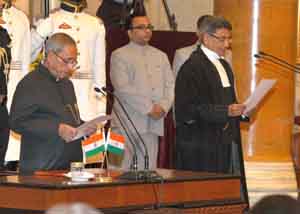
NEW DELHI, Apr 27: The new Chief Justice of India, R M Lodha, today said he did not agree with the idea of having fixed tenure for Chief Justices of high courts and the CJI and favoured continuing with the collegium system for appointment of judges in higher judiciary.
Justice Lodha, who took over as 41st CJI, however, advocated wider consultation with people outside collegium “without tinkering” with the memorandum of procedure prescribed by Law Ministry in appointment of judges.
He differed with his predecessor Justice P Sathasivam who had said that there should be two-year fixed tenure for CJI and Chief Justices of high courts.
“My view will be little different on the issue. This institution works on discipline. The fixed tenure is bound to affect the next member. If there is a fixed tenure of CJI then the legitimate expectations of other judges would be taken away. Average tenure of Supreme Court judges is less than four years then how do you expect fixed tenure of two years for the CJI,” Lodha said while interacting with reporters.
He said that judicial institutions would run smoothly if good people with impeccable character are appointed judges and this would be his “top priority” along with bringing more transparency within the judicial system.
“My first priority would be to appoint judges in high courts and the Supreme Court. My mantra is appoint good judges and rest will follow on its own. If we have good judges then we would have entire new complexion of judiciary in the next 7 or 8 years down the line.
“I am bringing more transparency and wider consultation in appointment of judges. Consultations to be done with 2-3 judges outside the collegium and with 2-3 lawyers of impeccable integrity,” he said.
The CJI said he will be writing to all chief justices of high courts in the regard.
Justice Lodha also made it clear that wide consultation for appointment of judges does not in any manner mean that he was making any reservation on the collegium system of selection and appointment of judges.
“This (wider consultation) is only for additional inputs. There is no tinkering with the memorandum of procedure prescribed by the Ministry of Law,” he said and added that “other than the collegium system there is no other suitable system (for appointment of judges).”
On the issue of judges’ kith and kin practising in the same high court, Justice Lodha said that there is nothing that a judge can do in such matters and it is up to the Bar to be “pro-active” and take action.
“Bar has the disciplinary control over the members. It is for the bar to take action and closely follow the conduct of the members. What can a judge do if some lawyers do not adhere to ethics. Rules are there and bar has to take action,” he said.
“If my son or daughter does not follow the code of conduct then Bar has to take action. Unfortunately, the role which the Bar is required to play is not being played by the Bar and unfortunately we are blamed,” he said, adding that Bar should also be vigilant on the issue of “bench-hunting” which cannot be tolerated.
Asked that some sections of society are not adequately represented in the judiciary, Justice Lodha said “judiciary knows no class, no caste, no majority, no minority, and we have to maintain balance. Why cannot be a talented lawyer spotted in the age group of 40-47 years and watch his conduct in the court(for appointment)”.
64-year-old Justice Lodha took over from Justice (retd) P Sathasivam who demitted office yesterday after nine months as the head of the judiciary.
The brief ceremony at Rashtrapati Bhawan’s Durbar Hall attended by Vice President Hamid Ansari, Prime Minister Dr Manmohan Singh, some Union Ministers, retired and serving judges, members of the Bar, besides Justice Sathasivam.
No Opposition leader was present at the function.
Justice Lodha will have a brief tenure of five months as CJI and is due to retire on September 27, this year.
When asked about reports of friction between judiciary and other organs of the Government, Justice Lodha said such a situation would not arise if each of them do not cross their well-defined field.
“I feel all three organs have definite, demarcated and well defined field to work. If all the three organs work within their fields and by working within their field if other organ perceives that there is some friction I think there is nothing wrong with it. But there would be no friction if each organ works within their sphere. The most important thing is that do not cross your limit.
“In policy matters, there are only a few instance in which the courts interfere. We give clear indication that this is the domain of Government unless we find that there is violation of Article 14 of the Constitution. We are guided by constitutional provisions.”
On sexual harassment complaints against retired apex court judges, he said a full mechanism is in place as per the law and Vishakha judgement has culminated in law which has to be strictly followed.
“Every act which is not good for society is also not good for judiciary. Judiciary has to work in best of its tradition,” he said.
He is heading the bench which is monitoring CBI’s probe into coal blocks allocation scam. He was also instrumental in passing orders making CBI free from any political interference and had referred to the agency as a “caged parrot”.
It was Justice Lodha’s Bench which had ordered that CBI will not share information with the political executive on coalgate probe.
The controversy had led to the resignation of Ashwani Kumar as the Law Minister in May last year. (PTI)

